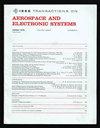基于全驱动系统的无解卷姿态控制:转换、设计和分析
IF 5.7
2区 计算机科学
Q1 ENGINEERING, AEROSPACE
IEEE Transactions on Aerospace and Electronic Systems
Pub Date : 2025-02-10
DOI:10.1109/TAES.2025.3540039
引用次数: 0
摘要
单位四元数具有全局表示和无奇点的特性,是最常用的姿态表示形式之一。然而,由于四元数表示法提供了两组四元数来描述一个方向,从而导致双覆盖特性,可能导致unwind现象的发生。这种现象说明旋转角度超过180°。在过去的几十年里,已经提出了许多方法来解决解绕现象。如引入带滞后的开关逻辑变量,将滑模控制技术与开关函数相结合,构造不同姿态误差函数,设计反unwind势函数等。大多数报道的无unwind控制器都是基于状态空间框架设计的;因此,引入额外的操作通常是不可避免的。与此相反,目前的工作是基于一个完全驱动的系统框架。由于全驱动系统控制器的特殊结构,使其不受四元数表示的双覆盖特性的影响。这意味着所提出的姿态控制器可以无unwind,并且不需要引入额外的操作来防止unwind现象的发生。理论分析和数值仿真验证了被控系统的稳定性和所提出控制器的无解卷特性。本文章由计算机程序翻译,如有差异,请以英文原文为准。
Unwinding-Free Attitude Control Based on Fully Actuated Systems: Transformation, Design, and Analysis
The unit quaternion is one of the most commonly utilized attitude representations because of its global representation and singularity-free properties. Nevertheless, the double cover property caused by the quaternion representation, which provides two sets of quaternions to describe an orientation, may lead to the occurrence of the unwinding phenomenon. This phenomenon implies that the rotation angles exceed 180°. In the past several decades, numerous methods have been proposed to address the unwinding phenomenon. For instance, introducing switching logic variables with hysteresis, combining sliding mode control technologies with switching functions, constructing different attitude error functions, designing antiunwinding potential functions, etc. Most reported unwinding-free controllers are designed based on the state-space framework; therefore, introducing additional operations is generally inevitable. Contrary to this, the present work is based on a fully actuated system framework. Since the special structure of the fully actuated system controllers, they are immune to the effects of the double cover property of the quaternion representation. This implies that the proposed attitude controllers can be unwinding-free, and no additional operations need to be introduced to prevent the occurrence of the unwinding phenomenon. Theoretical analyses and numerical simulations verify both the stability of the controlled system and the unwinding-free property of the proposed controllers.
求助全文
通过发布文献求助,成功后即可免费获取论文全文。
去求助
来源期刊
CiteScore
7.80
自引率
13.60%
发文量
433
审稿时长
8.7 months
期刊介绍:
IEEE Transactions on Aerospace and Electronic Systems focuses on the organization, design, development, integration, and operation of complex systems for space, air, ocean, or ground environment. These systems include, but are not limited to, navigation, avionics, spacecraft, aerospace power, radar, sonar, telemetry, defense, transportation, automated testing, and command and control.

 求助内容:
求助内容: 应助结果提醒方式:
应助结果提醒方式:


